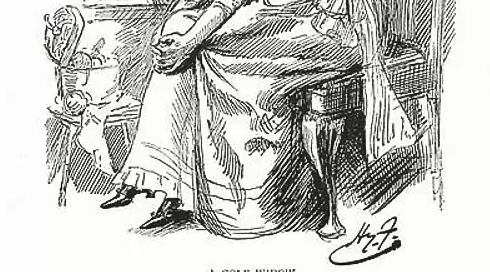In the late 16th century, golf was played by members of the Scottish nobility, possibly including among the women, Mary Stuart, Queen of Scots. But when golf clubs were formed in Scotland almost 150 years later, it was a man’s game. The St. Andrews club poet, George Carnegie (1795-1851) put it succinctly,
The game is ancient—manly—and employs
In its departments, women, men, and boys;
Men play the game, the boys the clubs convey,
And lovely woman gives the prize away.
Towards the end of the 19th century, the popularity of golf sharply increased among men not only in the British Commonwealth, but in the United States as well. More and more men began playing while leaving their wives (if married) at home for hours and hours. These abandon wives soon became humorously (or not) characterized as “golf widows.” The term may have first appeared in the book, The Badminton Library – Golf (1890) by Horace G. Hutchinson, as the caption under the drawing shown at the top of the article. Interestingly, the term is still in use today as a Google search will show. But for our purposes, three poems, written in the early 20th century tell the story behind the saying.
The first, written by James J. Montague, an American poet and writer, appeared in the November 1921 issue of The American Golfer. Montague writes his lines from the golfer husband’s point of view.
Lines to a Golf Widow
If you had said eight months ago
When January blizzards blew,
And all the greens were deep with snow,
That I must give up golf or you,
I might have stayed the fatal step,
I might before it was too late,
Have vowed that we should never separate.
If, even in the early Spring,
When we were playing winter rules,
When mud flew thick on every swing,
And balls fell “chug!” in casual pools,
You’d been disposed to raise a row
And talked of leaving me again,
I might have listened to you now
And then.
Indeed, along in mid-July
When sultry blew the listless breeze,
And temperatures ran rather high—
Say ninety-two or -three degrees,
Had you the riot statute read
Till I agreed to quit, I might—
I can’t be sure—I might have said:
“All right!”
But now, when greens are hard and fast,
And fairways like an emerald floor,
When I have got the swing at last
And confidently bawl out “Fore!”
Your threat to part may be a bluff’
Or you may really pack and go,
But I shall not be home enough
To know!
The second poem is by Robert K. Risk (1891–1961) from Songs of the Links, his delightful book of poems published in 1919. Risk was a Scottish lawyer, best known for his contributions to golf literature, particularly through his poetry. Risk’s poem, “A Paean for Winter,” reflects the musings of a golf widow, herself.
A Paean for Winter
Gone is the time when by the sad, grey sea
I waited patiently two weary rounds,
Gone are the days he spent ’twixt green and tee,
And Golf is now restrained within due bounds
For Summer fled I do not sigh “Alack-
A-day:” I’m very glad it can’t come back.
Gone are the evenings when he used to start,
After a scrambling meal—I hate high-teaing—
“Forgetful of the office and the mart,”
And also of his spouse’s very being;
His love for an insensate ball and cleek
Made me a widow six days in each week.
And now at last from Sunday until Friday,
He recognizes that he has a wife
Whose sole concern is not to keep things tidy
And share the merest fraction of his life,
Providing just the things he likes for dinner,
In case his bunker-work should make him thinner.
And now, when Winter fires and lamps are lit,
I have some respite from his golfing jargon,
Which, frankly, I don’t understand a bit—
It bored me nightly in the months that are gone;
Sometimes for a whole day, in winter weather,
He will forget his mania altogether.
Therefore that “scintillating constellation,”
The next Spring Meeting, never mocks my eye;
I can forget my old exasperation—
Now his Midsummer madness has gone by.
But if next year he flouts me for a “foursome,”
I shall burn all his clubs, or else divorce him.
Leave it to the Burke Golf Company of Newark, Ohio to offer a solution for the golf widow in a full-page ad that appear in the magazine The American Golfer’s January 12, 1924, issue. Their answer titled “Advice to a Golf Widow by Grantland Rice” (1880-1954) was contained in a six-line poem placed in the center of the ad. Rice was a legendary American sportswriter and poet, known for his elegant, lyrical prose. He is remembered for his poetic style and for popularizing the idea of sports as a noble pursuit.
The Golf Widow
After you have missed him for a week or even more—
When you've heard him raving, as he does, about his score,
Why take all the punishment, or wait back on the shelf,
Why not get a set of clubs and play the game yourself?
When he comes to tell you of the putts that he has blown,
Beat him to the alibi with troubles of your own.
There are a number of other “golf widow” poems, even some written more recently. But our three are sufficient to show how the plight of the golf widow would attract the attention of gifted golf poets.




